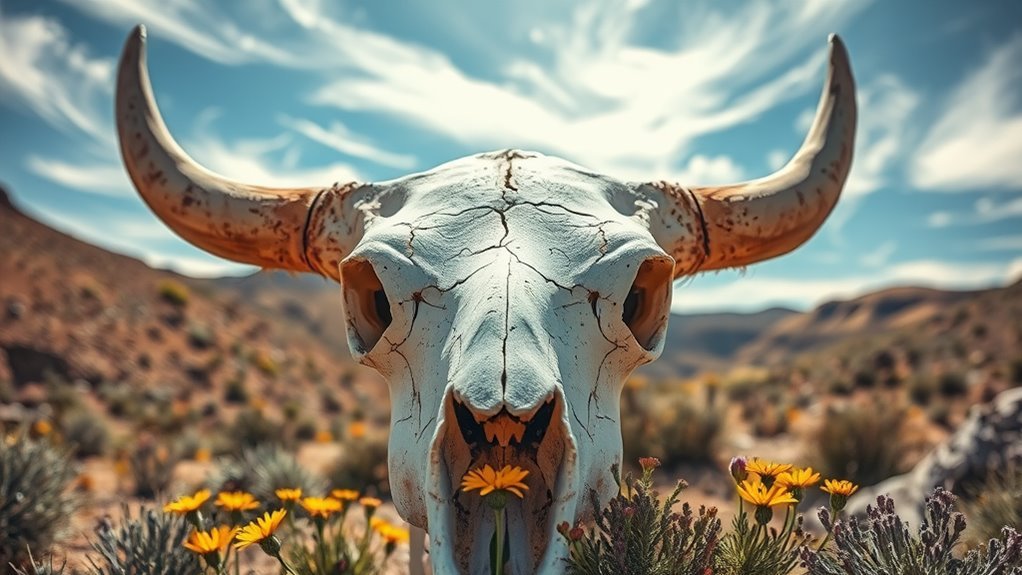13 Spiritual Meanings of Cow Skull
As we explore the 13 spiritual meanings of the cow skull, we uncover layers of significance that resonate deeply within our collective experience. This powerful symbol serves not only as a demonstration of strength and resilience but also as a bridge connecting us to nature and our ancestors. Each meaning invites us to reflect on our own spiritual journeys and community ties. However, the deeper implications of these meanings may surprise us, revealing insights into protection and wisdom that we might not have considered before. What might we discover about ourselves in this journey?
In a Nutshell
- Cow skulls symbolize strength and resilience, representing endurance through adversity and personal growth from life's challenges.
- They embody the cycles of life, death, and rebirth, reflecting transformation and the interconnectedness of all living things.
- Cow skulls serve as markers of fertility, linking livestock to agricultural abundance and nurturing aspects of nature vital for community survival.
- They connect individuals to ancestral wisdom, fostering a sense of belonging and continuity within cultural communities while offering guidance through life's journey.
- Acting as protective totems, cow skulls shield individuals from harm and negative energies, promoting resilience and fortitude in the face of challenges.
Symbol of Strength
The cow skull stands as a powerful symbol of strength, embodying resilience and endurance in various cultures. As we explore this imagery, we notice its deep ties to the concept of inner strength. For many communities, the cow skull isn't just a remnant of a once-living creature; it's a representation of survival and the ability to rise above adversity.
In Native American cultures, the cow skull serves as a reminder of the sacred connection between life and death, symbolizing the strength found in acceptance and transformation. Similarly, in ranching communities, it signifies hard work and perseverance—qualities we all endeavor to embody.
The cultural significance of the cow skull extends beyond mere aesthetics, inviting us to reflect on our own journeys. Each time we encounter this symbol, we're reminded of our collective strength and the resilience that resides within us.
It encourages us to connect with our roots and understand the importance of our shared experiences. By embracing the cow skull as a symbol of strength, we cultivate a sense of belonging, uniting us in our quest for inner strength and a deeper understanding of life's challenges.
Connection to Nature
Cow skulls embody a profound connection to nature, reflecting the intricate relationships between humans, animals, and the environment. When we observe these skulls, we're reminded of nature's balance and the cycles that sustain life. They serve as symbols of the interdependence that exists within ecosystems, where every species plays a role in maintaining ecological harmony.
By studying cow skulls, we can appreciate the lessons they impart about respect and stewardship. These remnants of life remind us that our existence is intertwined with the natural world. They encourage us to reflect on our impact on the environment and the necessity of fostering sustainable practices.
As we engage with the symbolism of cow skulls, we deepen our understanding of how we fit into the broader tapestry of life. This connection prompts us to embrace practices that honor the delicate balance of nature, recognizing that our actions resonate far beyond ourselves.
In recognizing the significance of cow skulls, we cultivate a sense of belonging to something greater. They invite us to participate in a collective journey towards ecological awareness and responsibility, reinforcing the bond we share with all living beings.
Representation of Life Cycles
Embodying the cycles of existence, cow skulls serve as poignant reminders of the life, death, and rebirth that characterize all living beings. When we examine these symbols, we realize they reflect our own life changes, echoing the natural rhythms we experience. Each skull tells a story, representing a point in the cyclical existence we all share.
In many cultures, these skulls symbolize the interconnectedness of life and the inevitability of change. They remind us that every ending is a precursor to a new beginning, reinforcing the idea that life isn't linear but rather a continuous loop of experiences. As we navigate our own journeys, we can find comfort in this understanding.
We often face challenges that force us to confront our mortality, but within that struggle lies the essence of growth. The cow skull, thus, becomes a visual metaphor for our resilience and adaptability.
Emblem of Resilience
Rooted in cultural traditions, cow skulls stand as powerful emblems of resilience, embodying the strength found in overcoming adversity.
As we explore the symbolism of the cow skull, we can see how it represents not just the struggles faced by the animal, but also our own journeys through hardship. Each mark and contour on the skull tells a story of survival, reflecting the inner strength required to endure life's challenges.
In many cultures, the cow is revered not only for its utility but also for its role in sustaining life. This duality illustrates that resilience is often born from necessity; we may find that our own trials cultivate our capacity for growth and adaptation.
The cow skull, consequently, serves as a reminder that while adversity is a part of life, so is the strength we gain through it.
Spirit of the Ancestors
When we consider the cow skull, we can't help but recognize its deep connection to the spirit of our ancestors. This connection invites us to reflect on the wisdom and experiences passed down through generations.
We find that the cow skull symbolizes not just survival, but also ancestor reverence, reminding us to honor those who came before us.
Here are three ways the cow skull embodies ancestral guidance:
- Cultural Heritage: The cow has been integral to many societies, representing sustenance and community. By honoring the cow skull, we reaffirm our ties to our cultural roots.
- Spiritual Connection: The skull serves as a conduit for communication with our ancestors. It encourages us to seek their guidance in our life's journey, fostering a sense of belonging and continuity.
- Ritual Practices: Many cultures incorporate cow skulls in rituals to celebrate life and death, reinforcing the belief that our ancestors are always with us, guiding our paths.
In acknowledging the spirit of the ancestors embodied in the cow skull, we create a bridge to our past, fostering unity and understanding in our present lives.
Sign of Abundance
The cow skull often symbolizes abundance in various cultures, illustrating the connection between life, sustenance, and prosperity. This emblem resonates deeply with our shared experiences in agricultural societies, where the cow has long been valued for its contributions to sustenance. By embracing an abundance mindset, we cultivate a perspective that recognizes the richness available to us, drawing parallels between the cow's offerings and our own potential for growth and prosperity.
In many agrarian communities, the cow skull serves as a reminder of the cycles of life and death, emphasizing the importance of nurturing the land to achieve agricultural prosperity. It reflects the bountiful harvests that arise from dedication and respect for nature, encouraging us to think holistically about our interconnectedness with the environment.
As we reflect on the symbolism of the cow skull, we become aware of our role in fostering abundance—not just for ourselves but for our communities as well. By acknowledging this connection, we strengthen our sense of belonging and purpose, realizing that an abundance mindset can transform our lives and those around us.
Together, let's honor this symbol and embrace the prosperity it represents.
Guardian of the Earth
Having explored the cow skull's representation of abundance, we can now understand its role as a guardian of the Earth. This sacred protector serves as a reminder of our connection to the land and the responsibilities we hold in nurturing it.
The cow skull embodies the essence of life cycles and the interconnectedness of all beings, acting as an earthly guardian that watches over the natural world.
Let's consider three key aspects of its significance:
- Symbol of Sustainability: The cow skull encourages us to adopt practices that respect and sustain our environment.
- Connection to Ancestry: It reflects the teachings of our ancestors, who understood the importance of living in harmony with nature.
- Reminder of Mortality: By acknowledging the skull, we confront our own mortality and the ephemeral nature of life, urging us to cherish our planet.
In embracing the cow skull as a guardian, we align ourselves with a deeper understanding of our role in the ecosystem.
Together, we can cultivate a sense of belonging that fosters respect for the Earth and all its inhabitants.
Indicator of Transformation
Amidst the rich symbolism of the cow skull, we find a powerful indicator of change. This iconic symbol resonates deeply with our collective experiences of transformation and growth. The cow skull, often associated with the cycle of life, serves as a reminder that our journey of change is both necessary and natural. It embodies the notion that endings lead to new beginnings, urging us to embrace the shifts in our lives.
In various cultures, the cow skull signifies spiritual evolution, representing the shedding of old identities and the emergence of new ones. When we encounter this symbol, it invites us to reflect on our personal journeys. It encourages us to examine the beliefs and patterns we've outgrown, urging us to release them with grace.
As we navigate our own journeys of change, the cow skull stands as a beacon of resilience. It reminds us that every alteration, no matter how challenging, plays a vital role in our spiritual evolution.
Together, we can honor this symbol, recognizing its power to inspire growth and to foster a deeper connection with our true selves. Let's embrace this journey of change and allow it to guide us toward our fullest potential.
Marker of Fertility
Cow skulls often serve as a profound marker of fertility in various cultures and spiritual traditions. They embody not just the cycle of life and death but also the promise of new beginnings.
In agricultural communities, they hold significant meaning, reminding us of the essential relationship between livestock and crop production. Through fertility rituals, we can see how cow skulls symbolize the sustenance and prosperity that farming brings to our lives.
Here are three key aspects of their role as markers of fertility:
- Ritualistic Use: Many cultures incorporate cow skulls in fertility rituals, invoking blessings for bountiful harvests and healthy livestock.
- Cultural Symbolism: In various spiritual contexts, cow skulls represent the nurturing aspects of nature, emphasizing the importance of fertility in sustaining communities.
- Agricultural Significance: The association of cow skulls with fertility ties directly to their role in agriculture, serving as a constant reminder of the cycles that govern our existence.
Reflection of Spiritual Journey
The symbolism of cow skulls extends beyond their role as markers of fertility; they also serve as profound reflections of our spiritual journeys. In our pursuit of personal growth, these skulls remind us of the cycles of life and death, urging us to confront our own transformations. Each curve and crack tells a story, inviting us to engage in inner reflection and consider how our experiences shape us.
When we encounter a cow skull, we're reminded of the permanence of change. It symbolizes the shedding of old beliefs and the acceptance of new truths. This process isn't always comfortable; it often requires us to dig deep into our souls, question our motivations, and redefine our paths.
As we navigate through these stages, the cow skull becomes a powerful symbol of resilience, urging us to embrace the lessons learned along the way.
Ultimately, the cow skull connects us to a larger narrative—one of collective experiences and shared growth. By recognizing its significance, we foster a sense of belonging, knowing that our spiritual journeys are intertwined with those of others. Together, we can celebrate the profound insights gained through our individual and shared experiences.
Representation of Wisdom
Wisdom often reveals itself in unexpected forms, and cow skulls epitomize this truth through their enduring presence in various cultures.
These skulls serve as powerful symbols, connecting us to wisdom traditions and ancient teachings that have guided humanity for centuries. When we explore their significance, we uncover layers of meaning that resonate deeply with our collective experiences.
Let's consider three key aspects of how cow skulls represent wisdom:
- Cultural Significance: Across different societies, cow skulls have been revered as symbols of strength and resilience, reminding us of the lessons learned from nature.
- Symbol of Change: They often signify the cycle of life and death, inviting us to reflect on our own journeys and the wisdom gained through our challenges.
- Connection to Ancestors: Cow skulls link us to our forebears, embodying the lessons passed down through generations, fostering a sense of belonging and continuity.
Connection to Community
Within the rich tapestry of cultural symbolism, cow skulls embody more than just individual wisdom; they forge connections within communities. When we look at the cow skull as a communal symbol, we recognize its role in fostering community support. It acts as a reminder of our shared experiences, echoing stories and traditions that bind us together.
In many cultures, cow skulls have been used in rituals that bring people together, reinforcing social ties and collective identity. This communal aspect is essential; it cultivates a sense of belonging that transcends individual existence. When we gather around these symbols, we share not only memories but also aspirations and challenges. They remind us of our interdependence, urging us to support one another through life's trials.
Moreover, cow skulls often serve as focal points in community gatherings, inviting dialogue and collaboration. They stand as a proof of collective resilience and shared history.
Symbol of Protection
As we explore the spiritual meanings of cow skulls, we find that they frequently symbolize protection across various cultures.
These skulls serve as powerful totems that shield individuals from harm and embody ancestral blessings. In times of spiritual warfare, they act as guardians, reminding us of our roots and the strength of our lineage.
Here are three key ways cow skulls symbolize protection:
- Cultural Significance: Many Indigenous cultures use cow skulls in rituals, believing they ward off negative energies and provide spiritual safety.
- Ancestral Connection: Cow skulls remind us of our ancestors' enduring presence, offering a sense of security and continuity in our lives.
- Symbol of Resilience: The skull's structure conveys strength and fortitude, encouraging us to stand firm against life's challenges.
Frequently Asked Questions
What Cultures View Cow Skulls as Sacred Symbols?
We've noticed that various cultures, like Native American beliefs and Hindu symbolism, often regard cow skulls as sacred symbols, representing strength, life cycles, and spiritual connections, highlighting their deep-rooted significance in our shared human experience.
Can Cow Skulls Be Used in Modern Spiritual Practices?
We can definitely incorporate cow skulls into modern spiritual practices. Their unique aesthetic serves as ritualistic decor while also promoting energy cleansing, allowing us to create meaningful spaces that resonate with our shared spiritual journeys.
How Do Cow Skulls Relate to Shamanism?
Cow skulls serve as powerful shamanic symbols, connecting us to ancestral wisdom. They remind us of the cycles of life and death, guiding our spiritual journeys and deepening our understanding of nature and interconnectedness.
What Materials Are Cow Skulls Typically Made From?
When we explore cow skull materials, we find they're typically crafted from natural bones, often adorned with paint or embellishments. Understanding cow skull crafting helps us appreciate their cultural significance and artistic value in various traditions.
Are There Any Rituals Involving Cow Skulls?
We've found that cow skull rituals often hold ceremonial significance in various cultures. These rituals connect communities, honoring traditions while fostering a sense of belonging among participants, reinforcing cultural identity and shared values through collective practices.

Naomi White is an esteemed expert in spirituality with a passion for uncovering the hidden meanings and messages within divine symbols. Naomi’s work aims to bridge the gap between the mystical and the everyday, helping others find guidance and inspiration in the symbols that surround us all.







